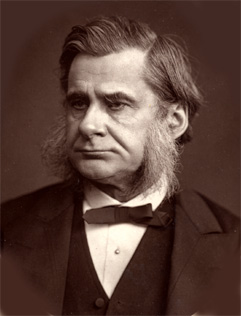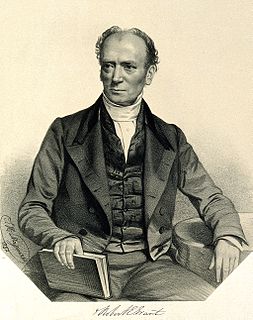
On the Origin of Species, published on 24 November 1859, is a work of scientific literature by Charles Darwin which is considered to be the foundation of evolutionary biology. Darwin's book introduced the scientific theory that populations evolve over the course of generations through a process of natural selection. The book presented a body of evidence that the diversity of life arose by common descent through a branching pattern of evolution. Darwin included evidence that he had collected on the Beagle expedition in the 1830s and his subsequent findings from research, correspondence, and experimentation.

Thomas Henry Huxley was an English biologist and anthropologist specialising in comparative anatomy. He is known as "Darwin's Bulldog" for his advocacy of Charles Darwin's theory of evolution.

Robert Edmond Grant MD FRCPEd FRS FRSE FZS FGS was a British anatomist and zoologist.

Jean Albert Gaudry, French geologist and palaeontologist, was born at St Germain-en-Laye, and was educated at the Collège Stanislas de Paris. He was a notable proponent of theistic evolution.

Transmutation of species and transformism are 19th-century evolutionary ideas for the altering of one species into another that preceded Charles Darwin's theory of natural selection. The French Transformisme was a term used by Jean Baptiste Lamarck in 1809 for his theory, and other 19th century proponents of pre-Darwinian evolutionary ideas included Étienne Geoffroy Saint-Hilaire, Robert Grant, and Robert Chambers, the anonymous author of the book Vestiges of the Natural History of Creation. Opposition in the scientific community to these early theories of evolution, led by influential scientists like the anatomists Georges Cuvier and Richard Owen and the geologist Charles Lyell, was intense. The debate over them was an important stage in the history of evolutionary thought and would influence the subsequent reaction to Darwin's theory.

Elizabeth Janet Browne is a British historian of science, known especially for her work on the history of 19th-century biology. She taught at the Wellcome Trust Centre for the History of Medicine, University College, London, before returning to Harvard. She is currently Aramont Professor of the History of Science at Harvard University.
Prof David Meredith Seares Watson FRS FGS HFRSE LLD was the Jodrell Professor of Zoology and Comparative Anatomy at University College, London from 1921 to 1951.

Michael James Benton is a British palaeontologist, and professor of vertebrate palaeontology in the School of Earth Sciences at the University of Bristol. His published work has mostly concentrated on the evolution of Triassic reptiles but he has also worked on extinction events and faunal changes in the fossil record.

James Moore, historian of science at the Open University and the University of Cambridge and visiting scholar at Harvard University, is noted as the author of several biographies of Charles Darwin. As a Cambridge research scholar and a member of the teaching staff at the Open University, he has studied and written about Darwin since the 1970s, co-authoring with Adrian Desmond the major biography Darwin, and also writing The Darwin Legend,The Post-Darwinian Controversies, and many articles and reviews.

Charles Robert Darwin was an English naturalist, geologist and biologist, best known for his contributions to the science of evolution. His proposition that all species of life have descended over time from common ancestors is now widely accepted, and considered a foundational concept in science. In a joint publication with Alfred Russel Wallace, he introduced his scientific theory that this branching pattern of evolution resulted from a process that he called natural selection, in which the struggle for existence has a similar effect to the artificial selection involved in selective breeding. Darwin has been described as one of the most influential figures in human history, and he was honoured by burial in Westminster Abbey.
David Bruce Norman is a British paleontologist, currently the main curator of vertebrate paleontology at the Sedgwick Museum, Cambridge University. For many years until 2013, Norman has also been the Sedgwick Museum's director.
Zofia Kielan-Jaworowska was a Polish paleobiologist. In the mid-1960s, she led a series of Polish-Mongolian paleontological expeditions to the Gobi Desert. She was the first woman to serve on the executive committee of the International Union of Geological Sciences.
The Pfizer Award is awarded annually by the History of Science Society "in recognition of an outstanding book dealing with the history of science"

John Albert Long is an Australian paleontologist who is currently Strategic Professor in Palaeontology at Flinders University in Adelaide, South Australia. He was previously the Vice President of Research and Collections at the Natural History Museum of Los Angeles County. He is also an author of popular science books. His main area of research is on the fossil fish of the Late Devonian Gogo Formation from northern Western Australia. It has yielded many important insights into fish evolution, such as Gogonasus and Materpiscis, the later specimen being crucial to our understanding of the origins of vertebrate reproduction.

The Plinian Society was a club at the University of Edinburgh for students interested in natural history. It was founded in 1823. Several of its members went on to have prominent careers, most notably Charles Darwin who announced his first scientific discoveries at the society.

Sir Richard Owen was an English biologist, comparative anatomist and paleontologist. Despite being a controversial figure, Owen is generally considered to have been an outstanding naturalist with a remarkable gift for interpreting fossils.
Patricia Arlene Vickers-Rich, also sometimes known as Patricia Rich, is an Australian palaeontologist and ornithologist of American origin. She has published several award-winning books on popular science. She is married to palaeontologist Tom Rich. Together the couple described the small herbivorous dinosaur Leaellynasaura, naming it after their daughter, Leaellyn Rich.

Donald Ross Prothero is an American geologist, paleontologist, and author who specializes in mammalian paleontology and magnetostratigraphy, a technique to date rock layers of the Cenozoic era and its use to date the climate changes which occurred 30-40 million years ago. He is the author or editor of more than 30 books and over 300 scientific papers, including at least 5+ geology textbooks.

Mark Paul Witton is a British vertebrate palaeontologist, author, and palaeoartist best known for his research and illustrations concerning pterosaurs, the extinct flying reptiles that lived alongside dinosaurs. He has worked with museums and universities around the world to reconstruct extinct animals, including as consultant to the Walking with Dinosaurs franchise and BBC's Planet Dinosaur, and has published several critically acclaimed books on palaeontology and palaeoart.
James Andrew Secord is an American-born historian. He is a professor of history and philosophy of science within the Department of History and Philosophy of Science at the University of Cambridge, and a fellow of Christ's College. He is also the director of the project to publish the complete Correspondence of Charles Darwin. Secord is especially well-known for his award-winning work on the reception of the anonymous Vestiges of the Natural History of Creation, a pioneering evolutionary book first published in 1844.













